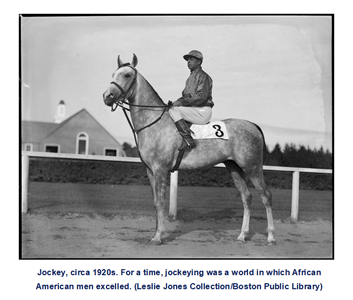Imagine if your great, great grandchild was viewing some cultural data on the Baltimore Times virtual communications portal during Black History Month in the year 2169, and happened upon a surreal account of a time 150 years earlier, in 2019, revealing that of the 494 National Basketball Association (NBA) players, 370 or 75 percent were African American, compared to only twenty or four percent, who were playing in the league contemporaneously.
Well, you don’t have to imagine that this exact scenario has befallen the horseracing industry in America. In a 2012 CNN exposé, The Forgotten Godfathers of Black American Sport, Sheena McKenzie examined how the post-Civil War, pre-Jim Crow horseracing industry, then a nearly exclusive vocation for African American jockeys, had dwindled to less than three dozen riders nationally, of nearly 800 currently registered jockeys.
“Today you’d struggle to find an African-American jockey on a U.S. race track. Just 30 of [roughly] 750 members of the National Jockey’s Guild are black,” according to McKenzie’s CNN report. African American jockeys have gone from domination to decimation in American horseracing, representing only four percent of professional riders today.
As in other instances during and since slavery, when African Americans turned garbage into gold, former slaves elevated thoroughbred racing to an artform despite being conscripted by slave owners as jockeys due to the perilous nature of racing horses for sport in the mid-1800s.
Not only were African American jockeys the original ‘horse whisperers,’ able to harmoniously engage with their steeds, they were able to develop a synergy that allowed them to function and perform as one with a horse, effectively channeling their mutual energies toward finishing first— efficiently and consistently.
Moreover, the early success of African American jockeys was further buttressed by the expertise of their support crews, also African Americans, who bred, trained, conditioned and groomed the race horses. These horse handlers were unsung but just as professional, and integral to the jockey’s success at the finish line.
The very first Kentucky Derby Stakes, in 1875, was won by a renowned African American jockey, Oliver Lewis, at age 19. Maybe this shouldn’t come as a surprise since 13 of the 15 jockeys competing in that race were African American. Fifteen of the first 28 Kentucky Derby Stakes were won by African American jockeys. However, the last African American jockey to win the Kentucky Derby was nearly 120 years ago in 1902 by 19-year-old James Winkfield, who also won the sweepstakes in 1901.
Twenty years after Winkfield’s first Kentucky Derby win, 1921, the last African American jockey would compete in the prestigious Churchill Downs sweepstakes for the duration of the 20th century. Since 1921, only two African American jockeys have competed in the Kentucky Derby stakes: Marlon St Julien in 2000 and Kevin Krigger in 2013.
Besides seeing a previously spectacular display of African American athleticism essentially stolen as many of the culture’s contributions have over the centuries, your great, great grandchild’s visit to the Baltimore Times history portal would also provide them a glimpse of the admiration, even if fleeting, that the larger society would have for African American sports heroes.
African American jockey’s success earned them cultural adulation and financial wealth comparable to today’s sports superstars. Isaac Burns Murphy the first jockey to win the Kentucky Derby three times, in 1884, 1890 and 1891. By 1887 he was arguably the highest paid athlete in the U.S., the first millionaire black athlete and in some quarters considered the best professional jockey of all time.
Some estimates say Isaac Murphy won 44 percent of his races, while the consensus accepts his success rate on the track being at least one win in three. An anonymous sports writer wrote about Murphy at the time: “He has a steady hand, a quick eye, a cool head, and a bold heart.”
Not only did Burns employ a Caucasian valet, his purchase of a large home in Lexington, Kentucky was covered on the front of the June 13, 1887 edition of the New York Times.
The prevalence and good fortune of African American jockeys began to wane around the turn of the century. After 1900, the backlash of racism exercised through Jim Crow laws, and the lucrative lure of horseracing was attracting Caucasian riders who employed racist threats and physical intimidation to drive African American jockeys out of the sport.
There were frequent accounts of African American jockeys and their horses being steered against the rail, and sometimes shoved over, during races. Horse owners began to deny opportunities to African American jockeys less concerned about the riders well-being as much as their concern of possible injury to their expensive thoroughbreds.
Regi Taylor is a West Baltimore native. The married father of four is an artist, writer and media professional specializing in political history.
